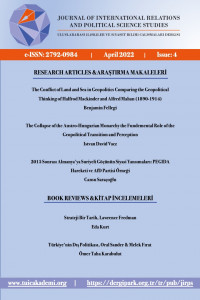Abstract
11 Eylül 2001 terör saldırıları, Batı dünyasında ırkçılık, yabancı düşmanlığı ve İslamofobi gibi köklü sorunların yükselişini hızlandıran çarpıcı bir dönem başlatmıştır. 11 Eylül sonrası dönemde yaygınlaşan düşmanca söylem ve tutumlar, Avrupa toplumlarında nefret tohumlarının filizlenmesi için uygun bir ortam meydana getirmiştir. 2015 yılında tepe noktasına ulaşan yoğun Suriyeli göçü ile birlikte Almanya’da göç tartışmaları tekrar siyasetin ana gündem konularından biri olmaya başlamıştır. Suriye İç Savaşı’ndan kaçan Suriyeli mülteciler Avrupa’dan sığınma talep etmişlerdir. Angela Merkel’in bir süre yürüttüğü açık kapı politikasının da etkisi ile Almanya’da toplum genel olarak yerinden olmuş kişilere karşı hoşgörülü bir tutum izlese de yeni gelenlerin özellikle Müslüman olmasından kaynaklanan hoşnutsuzluk da kendisini göstermeye başlamıştır. Bu iklimi güzel okuyan Almanya için Alternatif Partisi (AfD/Alternative für Deutschland), siyasi kampanyasını özellikle göçmen karşıtlığı ile şekillendirmiş ve en nihayetinde 2017 yılında Almanya Federal Meclis seçimlerinde %12,6 oy oranıyla önemli bir konum kazanmıştır. Parti, programında ve seçim kampanyalarında özellikle göçmen karşıtlığı, yabancı düşmanlığı ve İslam karşıtlığına vurgu yapmıştır. AfD’nin kuruluşundan bir yıl sonra Ekim 2014'te Dresden'de kurulan PEGIDA ise aynı söylemi savunan ve özellikle Avrupa’nın İslamlaşmasına karşı kurulmuş bir örgüttür. Bu çalışmada, 2015 yılındaki mülteci krizini takiben Almanya’ya göç eden Suriyeli mültecilere karşı ortaya çıkan tepkiler ve AfD ile PEGIDA’nın bu tepkiler doğrultusundaki siyaseti ve hareketleri incelenecektir.
Keywords
References
- Abadan-Unat, Nermin (2017). Bitmeyen Göç. İstanbul: İstanbul Bilgi Üniversitesi Yayınları,41-46.
- Abbas, Tahir(2017)." Ethnicity and politics in contextualising far". LSE Research Online, 7,54-63
- Lewicki,Aleksandra(2018). "Race, Islamophobia and the politics". Patterns of Prejudice, 509-512.
- Alkan, Nail (2015)." Avrupa’da Yükselen Irkçılık: Pegida Örneği". Dergi Park, 283.
- Aras ,İlhan; Sağıroğlu ,Akın(2020). "Almanya için Alternatif Partisi'nin Göçmen Karşıtlığı ". Sosyal Politika Çalışmaları Dergisi,37-42.
- Bayraklı, Enes; Hafez, Farid (2017). "The state of Islamophobia in Europe". European Islamophobia Report , 2017.
- Bbcnews (2015). "Pegida: Kebap yemeyin, Türkiye'ye gitmeyin",https://www.bbc.com/turkce/haberler/2015/11/151108_pegida_turkiye_kebap(Erişim05.12.2021)
- Bbcnews(2017). "Almanya'da Merkel 4. kez genel seçimi kazandı, AfD yüzde 13 oyla Meclis'e girdi", https://www.bbc.com/turkce/haberler-dunya-41380859 (Erişim 03.01.2022)
- Bbcnews (2017). "Almanya seçimleri: Göç ve İslam karşıtı AfD ana muhalefet partisi mi olacak?", https://www.bbc.com/turkce/haberler-dunya-41368798(Erişim:09.01.2022)
- Bbcnews (2018). "Reality Check: Are migrants driving crime in Germany?", https://www.bbc.com/news/world-europe-45419466(Erişim:01.02.2022)
- Bbcnews(2021). "Almanya seçimleri: Sosyal Demokratlar seçimleri kazandı, Merkel'in partisi tarihinin en düşük oyunu aldı, gözler koalisyon pazarlıklarında",https://www.bbc.com/turkce/haberler-dunya-58702421(Erişim:15.02.2022)
- Beltran, Veda E (2017). "Xenophobia, Populism, and the Rise of the Far-Right in France and Germany". CMC Senior Theses,34.
- Borneman, John; Fachandi-Ghassem ,Parvis (2017). "The concept of Stimmung From indifference to xenophobia in Germany’s refugee crisis". Hau: Journal of Ethnographic Theory, 105-135.
POLITICAL REFLECTIONS OF SYRIAN MIGRATION TO GERMANY AFTER 2015: THE CASE OF PEGIDA MOVEMENT AND AfD PARTY
Abstract
The terrorist attacks of September 11, 2001 started a striking period that accelerated the rise of deep-rooted problems such as racism, xenophobia and Islamophobia in the Western world. The hostile rhetoric and attitudes that became widespread in the post-9/11 period created a suitable environment for the seeds of hatred to sprout in European societies. With the intense Syrian migration reaching its peak in 2015, the immigration debate in Germany has once again become one of the main agenda topics of politics. Syrian refugees fleeing the Syrian Civil War sought asylum in Europe. With the effect of Angela Merkel's open-door policy for a while, although the society in Germany generally followed a tolerant attitude towards the displaced, the discontent caused by the new arrivals, especially Muslims, started to show itself. The Alternative Party for Germany (AfD/Alternative für Deutschland), which reads this climate well, shaped its political campaign especially with anti-immigration and ultimately gained an important position in the German Bundestag elections in 2017 with 12.6% of the votes. The party especially emphasized anti-immigration, xenophobia and Islamophobia in its program and election campaigns. PEGIDA, which was founded in Dresden in October 2014, a year after the establishment of the AfD, is an organization that advocates the same discourse and was founded especially against the Islamization of Europe. In this study, the reactions to the Syrian refugees who migrated to Germany following the refugee crisis in 2015 and the policies and actions of the AfD and PEGIDA in line with these reactions will be examined.
Keywords
References
- Abadan-Unat, Nermin (2017). Bitmeyen Göç. İstanbul: İstanbul Bilgi Üniversitesi Yayınları,41-46.
- Abbas, Tahir(2017)." Ethnicity and politics in contextualising far". LSE Research Online, 7,54-63
- Lewicki,Aleksandra(2018). "Race, Islamophobia and the politics". Patterns of Prejudice, 509-512.
- Alkan, Nail (2015)." Avrupa’da Yükselen Irkçılık: Pegida Örneği". Dergi Park, 283.
- Aras ,İlhan; Sağıroğlu ,Akın(2020). "Almanya için Alternatif Partisi'nin Göçmen Karşıtlığı ". Sosyal Politika Çalışmaları Dergisi,37-42.
- Bayraklı, Enes; Hafez, Farid (2017). "The state of Islamophobia in Europe". European Islamophobia Report , 2017.
- Bbcnews (2015). "Pegida: Kebap yemeyin, Türkiye'ye gitmeyin",https://www.bbc.com/turkce/haberler/2015/11/151108_pegida_turkiye_kebap(Erişim05.12.2021)
- Bbcnews(2017). "Almanya'da Merkel 4. kez genel seçimi kazandı, AfD yüzde 13 oyla Meclis'e girdi", https://www.bbc.com/turkce/haberler-dunya-41380859 (Erişim 03.01.2022)
- Bbcnews (2017). "Almanya seçimleri: Göç ve İslam karşıtı AfD ana muhalefet partisi mi olacak?", https://www.bbc.com/turkce/haberler-dunya-41368798(Erişim:09.01.2022)
- Bbcnews (2018). "Reality Check: Are migrants driving crime in Germany?", https://www.bbc.com/news/world-europe-45419466(Erişim:01.02.2022)
- Bbcnews(2021). "Almanya seçimleri: Sosyal Demokratlar seçimleri kazandı, Merkel'in partisi tarihinin en düşük oyunu aldı, gözler koalisyon pazarlıklarında",https://www.bbc.com/turkce/haberler-dunya-58702421(Erişim:15.02.2022)
- Beltran, Veda E (2017). "Xenophobia, Populism, and the Rise of the Far-Right in France and Germany". CMC Senior Theses,34.
- Borneman, John; Fachandi-Ghassem ,Parvis (2017). "The concept of Stimmung From indifference to xenophobia in Germany’s refugee crisis". Hau: Journal of Ethnographic Theory, 105-135.
Details
| Primary Language | Turkish |
|---|---|
| Subjects | International Relations |
| Journal Section | Research Articles |
| Authors | |
| Early Pub Date | April 23, 2022 |
| Publication Date | April 30, 2022 |
| Submission Date | January 14, 2022 |
| Published in Issue | Year 2022 Issue: 4 |

